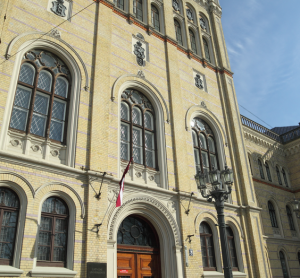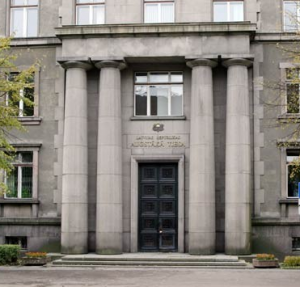Responsibility
We are convinced that social responsibility cannot be simply a statement. For the benefit of each client, society, the environment and ourselves, it has to be a well thought-out and real action. The law office NOVIUS sees socially responsible activity as its obligation both in relations with its clients and the entire of society and the environment. Therefore we care for each client, the development of the country, the legal field and the environment, and look to be involved in these areas wherever possible.
Responsibility towards the client
The law office NOVIUS applies an individual approach to each client – we try to find the best solutions to each enterprise’s or client’s problem, issue or situation which they have entrusted to us. Every case that arrives at NOVIUS is very important to us. Therefore we treat our clients, their wishes, emotions and rights responsibly.
Responsibility towards a lawful country
To promote entrepreneurship and increase living standards in Latvia, it is very important to have harmonious legal order in the country. Therefore, the law office NOVIUS also considers the promotion of legal understanding to be one of its obligations. By being present in the process of discussing and implementing amendments to the laws, participating in work groups, preparing scholarly publications and explaining the contents of laws, we promote legal understanding and contribute to the development of a lawful country.
Responsible office management
A responsible attitude towards our employees and their work, as well as the employees’ responsible attitude towards the environment helps the law office NOVIUS to maintain respectful and reliable relationships. When organising our office work, we consider ways of resource (electricity, water, paper, etc.) utilisation, recycling whenever possible.
Responsibility towards the new generation of lawyers
The development of the legal field in Latvia largely depends on the preparation of the new generation of lawyers. Knowledge obtained at school is not enough; practical experience, understanding and preparation are also necessary. Moreover, the new specialists must be reassured of the importance of a lawyer adhering to a set of values in their work.
NOVIUS gladly participates in educating new specialists by sharing its experience. Every year we ensure internships to several law students at our law office.
Responsibility towards standards in the field
We fully realise that our activities, decisions and work culture have an impact on standards in the field, therefore we are very responsible towards each decision we make, each idea we express and our activity in general. We are certain that every law office has to contribute to creating a positive and professional image of the legal field in Latvia.
Responsibility towards the environment
We should never forget that the environment in which we work is of great benefit to us and helps with the implementation of not only our professional, but other life goals as well. Therefore we feel a great responsibility towards preserving, maintaining and keeping it clean.
NOVIUS actively participates in various campaigns related to protecting and improving the environment by giving legal consultations or practically helping to clean up the forests, meadows and cities of Latvia. If every one of us were to do one little thing, Latvia would become so much more beautiful.
Informējam Jūs, ka šajā tīmekļa vietnē tiek izmantotas sīkdatnes (cookies), lai iegūtu anonimizētu pārskatu par lietotāju aktivitātēm vietnē.
This site is using cookies to collect anonymised statistics about the user activity on the site.
Vairāk informācijas / More information
Sīkdatne jeb sīkfails (angļu: cookie — burt. 'cepums'), ir tīmekļa servera nosūtīta neliela teksta virkne klientam (parasti tīmekļa pārlūkprogrammai), kura tiek saglabāta lietotāja datorā kā parasta datne. Ar tās palīdzību serveris var identificēt lietotāju, pārbaudot klienta atsūtīto sīkdatni. Šis mehānisms tika ieviests tādēļ, ka pats HTTP protokols neuztur savienojuma stāvokli, un klienta katru jaunu pieprasījumu serveris uzskata par jaunu klientu.
Sīkdatņu mehānismu apraksta RFC 2965 (HTTP State Management Mechanism), kas iznāca 2000. gadā un nomainīja RFC 2109.
Visbiežāk sīkdatnes izmanto lietotāju autentifikācijai (lietotājam ievadot savu lietotājvārdu un paroli, serveris nosūta uz lietotāja datora unikālu teksta virkni, pēc kā vēlāk var noteikt, ka lietotājs ir pieslēdzies sistēmai), sesijas uzturēšanai, kā arī specifiskas informācijas saglabāšanai par lietotāju. Izmantojot sīkdatnes, lietotājs veido tīmekļa vietni atbilstoši savām vēlmēm un interesēm.
Kopš sīkdatņu ieviešanas daudzi interneta lietotāji ir noraizējušies par personiskās dzīves izsekošanu, jo ar sīkdatnēm var izsekot lietotāja veiktās darbības un ieradumus, kad tas veic tīmekļa lapu pārlūkošanu. Sakarā ar to vairākās valstīs (ASV, Eiropas Savienībā) ir pieņemti likumi, kas regulē sīkdatņu lietošanu. Bez tam sīkdatņu negatīvs aspekts ir slikta drošība, jo tās ne vienmēr var precīzi identificēt lietotāju (ja datoru izmanto vairāki lietotāji), tās var ļaunprātīgi pārtvert un izmainīt.
Sīkdatnes ir iespējams arī nobloķēt, bet, tiklīdz tas ir izdarīts, var rasties problēmas, jo var nestrādāt kāda no tīmekļa vietnes piedāvātajām funkcijām vai pat liegta piekļuve pie tās. Dažādām pārlūkprogrammām ir atšķirīgi veidi, kā nobloķēt sīkdatnes. Sīkdatnes, kā jebkuru failu, ir iespējams arī izdzēst, bet tas nozīmē, ka uz sīkdatņu pamata veiktie iestatījumi netiks saglabāti.
An HTTP cookie (also called web cookie, Internet cookie, browser cookie, or simply cookie) is a small piece of data sent from a website and stored on the user's computer by the user's web browser while the user is browsing. Cookies were designed to be a reliable mechanism for websites to remember stateful information (such as items added in the shopping cart in an online store) or to record the user's browsing activity (including clicking particular buttons, logging in, or recording which pages were visited in the past). They can also be used to remember arbitrary pieces of information that the user previously entered into form fields such as names, addresses, passwords, and credit card numbers.






